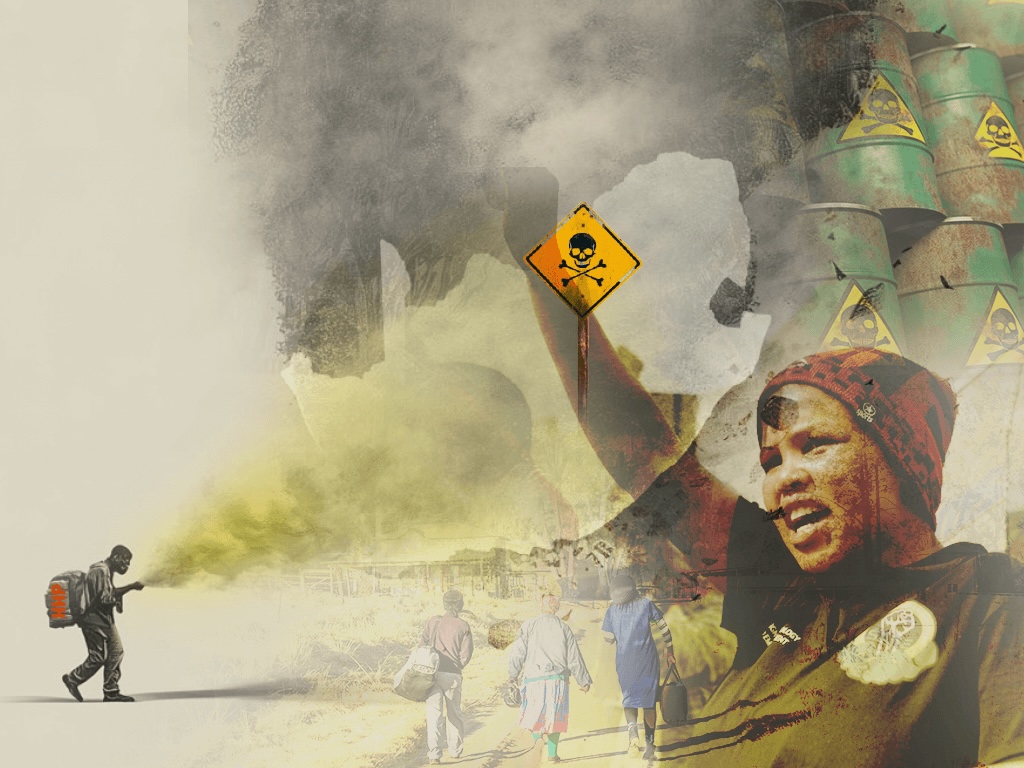Latest Resources

21 July 2025
South African Compendium on pesticides is a comprehensive database listing over 100 papers produc...
A user-friendly resource for researchers, advocates, and civil society ACB is proud to release a collation of the past two decades of research done on pesticide use in South Africa, in the form of a searchable (and downloadable) database, below. For the first time, this extensive body of scientific evidence of the harm caused by […]

26 May 2023
Assessment of support for agroecology in South Africa’s policy landscape
by Dr Stephen Greenberg (Veuillez cliquer ici pour le français) In March 2023, civil society organisations and farmers met with the Portfolio Committee on Agriculture, Land Reform and Rural Development to share views on agroecology and to promote a call from 58 organisations for a national agroecology strategy. In support of the process, the ACB […]

28 April 2022
The financialisation of malaria in Africa: Burkina Faso, rogue capital & GM /gene drive mosq...
(Veuillez cliquer ici pour lire en français) The African Centre for Biodiversity (ACB) hereby publishes a new research paper, titled, “The Financialisation of malaria: Burkina Faso, Rogue capital & GM/gene drive mosquitoes.” This paper seeks to understand the financialisation of malaria as a vehicle for rogue capital in a context of a weakened state (through […]

14 March 2017
ACB Submission to Competition Commission on Bayer Monsanto merger
This submission is made by the ABC because of serious public interest concerns about the proposed merger between Bayer and Monsanto. This merger is occurring in the context of other related mergers in agricultural input supply, between ChemChina-Syngenta and Dow-Du Pont. We urge the Commission to consider the wider implications of these mergers beyond a […]

4 July 2012
Comments on COMESA’s Draft Policy on Commercial Planting, Trade and Emergency Food Aid Invo...
On the 8th and 9th May 2012 COMESA held a meeting in Lusaka, Zambia, to review a draft policy on the regulation and trade of GMOs for the region. While the Biotech Industry was very well represented at the meeting, civil society was completely left out of the process. This policy is being drafted behind […]

10 November 2010
Opposition to Pioneer Hi Bred’s merger with Pannar, submitted to Competitions Commission
As a stakeholder, the ACB was requested by the Competition Commission to make written comments on the proposed merger between Pioneer Hi Bred and Pannar, which we submitted to the Commission on the 21st of October, 2010. In this submission, we raise the following further pertinent issues: We provide in several annexes, the seeds under […]

13 July 2010
Comments on COMESA’s Draft Policy on GMOs
The African Centre for Biosafety (ACB) was very recently handed a copy of the Common Market for Eastern and Southern Africa’s (COMESA) ‘Draft policy statements and guidelines for commercial planting of GMOs, Trade in GMOs and Emergency Food aid with GMO content’. Having perused the policy we are alarmed and outraged that COMESA appears to […]

13 July 2009
Comments on Nigeria’s Draft Biosafety Bill
An Act to Provide for the Management of Biosafety and other related matters, 2007 Environmental Rights Action (ERA) (Friends of the Earth, Nigeria) has approached the African Centre for Biosafety (ACB) to provide them with our comments on the latest draft of their country’s biosafety bill. The ACB has in the past, provided formal and […]

11 June 2009
COMMENTS ON THE NATIONAL BIOTECHNOLOGY SAFETY BILL OF UGANDA
We have in the past, commented on several drafts of Uganda’s biosafety law and will not repeat the issues canvassed therein regarding the role and influence of the United States. We have been requested by civil society groups to comment on the National Biotechnology Safety Bill, 2008, approved by Uganda’s Cabinet during April 2008. Uganda […]

20 May 2009
Kenyan Biosafety Bill – May 2009
Genetically Modified crop plants continue to be offered to Africa as a solution to alleviate poverty and stave off hunger. It is a trite observation that hunger has little to do with how efficiently food is produced or how much food is available for consumption. Indeed, hunger is rooted in socio-economic realities which limit the […]
